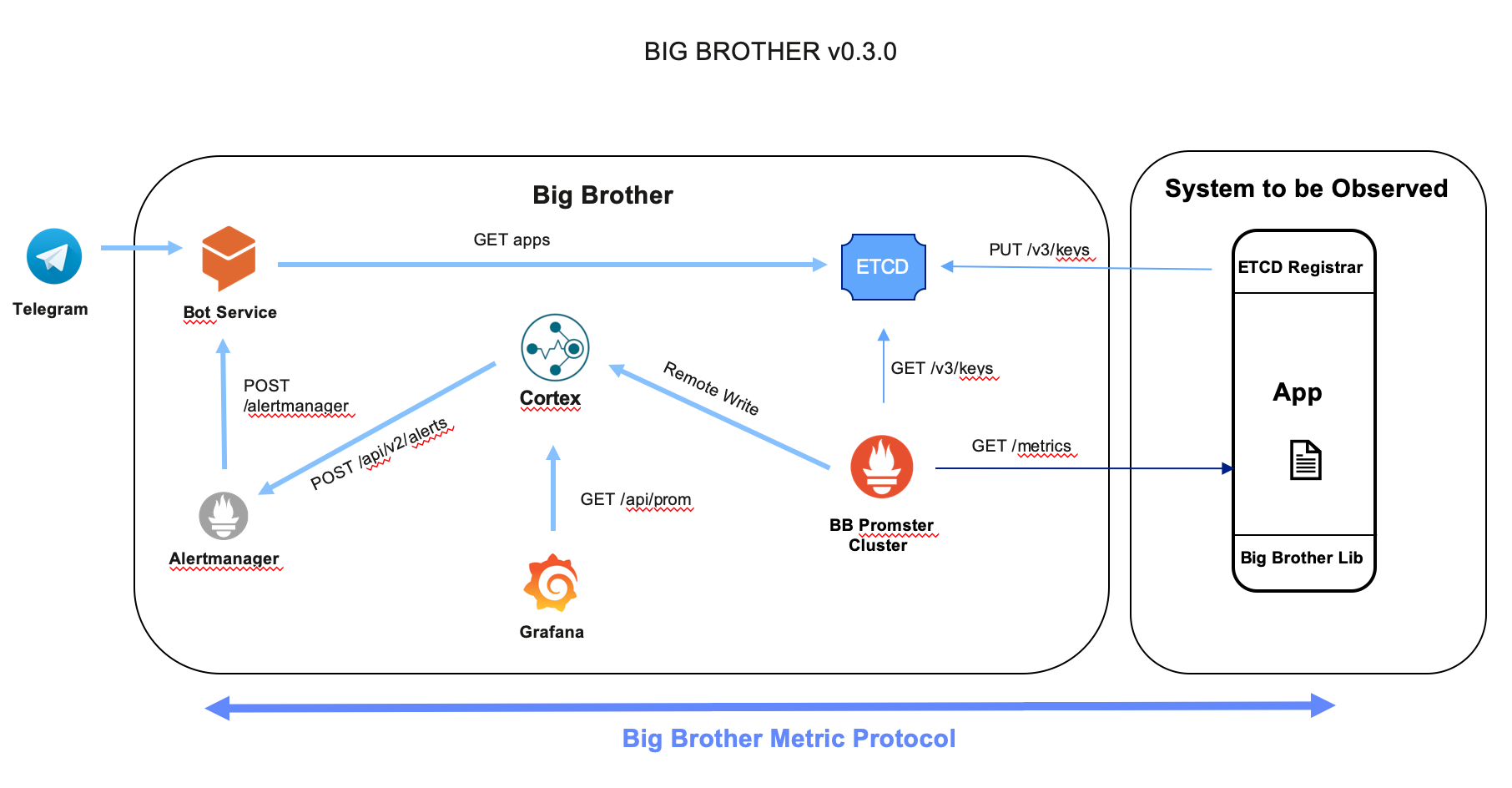This project defines a service to effectively communicate observability events to application stakeholders.
Basically, it collects the necessary metrics from a client provided BB Promster cluster endpoint.
More specifically, the Big Brother app federates it's own monitoring cluster to the provided endpoint, and starts collecting Big Brother specific metrics, with the help of some useful programming libraries.
These metrics are treated as the fundamental protocol behind Big Brother's capabilities.
A valid Big Brother library should expose the following metrics:
request_seconds_bucket{type, status, isError, method, addr, le}
request_seconds_count{type, status, isError, method, addr}
request_seconds_sum{type, status, isError, method, addr}
response_size_bytes{type, status, isError, method, addr}
dependency_up{name}
application_info{version}
In detail:
request_seconds_bucketis a metric that defines the histogram of how many requests are falling into the well defined buckets represented by the labelle;request_seconds_countis a counter that counts the overall number of requests with those exact label occurrences;request_seconds_sumis a counter that counts the overall sum of how long the requests with those exact label occurrences are taking;response_size_bytesis a counter that computes how much data is being sent back to the user for a given request type. It captures the response size from thecontent-lengthresponse header. If there is no such header, the value exposed as metric will be zero;dependency_upis a metric to register weather a specific dependency is up (1) or down (0). The labelnameregisters the dependency name;- Finally,
application_infoholds static info of an application, such as it's semantic version number;
For a specific request:
typetells which request protocol was used (e.g.grpc,http,<your custom protocol>);statusregisters the response status code;isErrorlet you know if the request's response status is considered an error;methodregisters the request method (e.g.GETfor http get requests);addrregisters the requested endpoint address;- and
versiontells which version of your service has handled the request;
The following libraries make part of Big Brother official libraries:
express-monitorfor Node JS Express apps;servlet-monitorfor Java Servlets apps;flask-monitorfor Python Flask apps;- [TODO]
iris-monitorfor Golang Iris apps; - [TODO]
mux-monitorfor the Golang Mux apps;
Without these, you would have to expose the metrics by yourself, possibly leading to inconsistencies and other errors when setting up your app's observability infrastructure with Big Brother.
The Big Brother app is composed by an ETCD cluster, a Dialogflow Bot, a Prometheus Alertmanager, a Grafana and a Promster cluster, all with their own configuration needs.
The ETCD cluster serves 3 purposes:
- Register client
bb-promsterclusters; - Register Big Brother's own monitoring cluster, to allow for sharding via federation;
- [TODO] Register Big Brother's alertmanager cluster, for high availability;
Gets configured by:
ETCD_LISTEN_CLIENT_URLS: the addresses ETCD daemon listens to client traffic;ETCD_ADVERTISE_CLIENT_URLS: list of an ETCD client URLs to advertise to the rest of the cluster;
A bot to communicate with the interested stakeholders. It's purposes are to:
- Enable CRUD of client apps to be observed by Big Brother; and
- Alert on possible problems;
A service to host alerting configuration on top of the alerts being dispatched by the Promster Cluster.
Gets configured by:
WEBHOOK_URL: the bot address
The service that federate's on the client's bb-promster cluster, hosts and evaluates alerting rules and dispatches alerts accordingly.
Gets configured by:
BB_PROMSTER_LEVEL: integer greater than 0 that defines which level this promster sits on it's own federation cluster;ETCD_URLS: defines the ETCD cluster urls, separated by comma;ALERT_MANAGER_URLS: defines the alertmanager cluster urls;
-
Talk to Telegram's Bot Father, create your own bot and get it's Telegram Token;
-
Open a Dialogflow account, create a new project and import the configs from the folder
bot/dialogflow; -
Train your intents;
-
Setup a Telegram integration with the Token obtained in
step 1; -
Expose your
port 3001and inform a reachable HTTPS address to the Dialogflow fulfillment configuration. We recommend using ngrok for that; -
Type the following commands in your terminal to interact with your bot directly through Telegram:
TELEGRAM_TOKEN=<XXXXX:YYYYYY> docker-compose up -d --build
This will run an example app with its own
bb-promstercluster and the Big Brother app with its components. -
Now go to the bot on Telegram, and add a new App. Inform the App name (e.g.
Example) and the app address (e.g.example-bb-promster:9090). You'll be automatically subscribed to the app you've just added.
The example client app bb-promster cluster will get registered to the Big Brother's ETCD and Big Brother will then start collecting metrics by federating it.
Open your browser on http://localhost:3000 to access the provided Grafana dashboard (user bigbrother, password bigbrother).
Also, access http://localhost:3001/test on your browser to dispatch test alerts and see if you get them at your Telegram chat.
The name is inspired by George Orwell's 1984 Big Brother character.
In this book, Big Brother is an entity that is omniconscious, being able to watch everyone, everywhere.
This is exactly what we aim to achieve with this project: a way for you to easily and effectively watch every project you have without any prior knowledge of observability concepts and Prometheus best practices.
